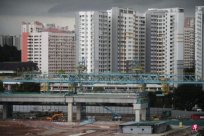
In accordance with changes in the global tax system, Singapore will implement the initiative of the Economic Cooperation and Development Organization (OECD) from January next year to impose a minimum effective tax rate for multinational companies.This means that Singapore cannot continue to use traditional tax rewards to attract multinational companies to invest.In order to cope with new tax rules, many countries have made corresponding changes.The Singaporean government announced on Friday (February 16) the new fiscal budget of the fiscal year. It is expected that there will also be relevant announcements to maintain the light of Singapore as a commercial hub.
In order to prevent multinational companies from transferring profits to other low -tax regions, the second -generation second -generation second generation to prevent tax base erosion and profit transfers three years ago (Base Eross and Profit Shifting 2.0 (BEPS 2.0)The tax country's turnover to the Group's turnover is higher than 750 million euros (about S $ 186 million), which levies at least 15%of the valid tax rate.Huang Xuncai, the Deputy Prime Minister and Minister of Finance, announced last year when a fiscal budget statement announced that Singapore will implement the lowest tax rate from 2025, and through domestic replenishment of taxes to ensure that multinational companies pay at least 15%of taxes.
Although the current company tax rate of Singapore is 17%, after deducting tax rewards and discounts, the effective tax rate of some companies is far less than 15%.The minimum tax rate may increase the taxes obtained by Singapore from multinational companies, but it may affect Singapore's ability to attract foreign capital. Therefore, while implementing the minimum tax rate, there must be corresponding response measures.Facing the changing world situation, many companies are cutting costs, and the minimum tax rate will increase the tax burden of multinational companies. The government needs to allow these multinational companies to have enough reasons to continue to invest and expand in Singapore.Although the annual investment data of the Economic Development Bureau shows that Singapore obtained a commitment of 12.7 billion yuan in fixed asset investment in 2023, which is in line with the medium and long -term target of 8 billion to 10 billion yuan each year, but the international environment is unstable and the competition for foreign investment has intensified.In addition, the cost of business in Singapore is relatively expensive due to resource limitations, which allows Singapore to face increasingly severe challenges when attracting foreign capital.
Industry insiders look forward to the government's discussing new measures. Without BEPS 2.0, rewarding foreign investment will continue to invest in Singapore to maintain Singapore's competitiveness as the regional investment and commercial hubs.The suggestions of tax experts include incentive measures that will not reduce the effective tax rate of multinational enterprises, such as cash subsidies such as government allowances and refundable tax reductions (Refundable Tax Credits).
The low tax rate is not the only condition to attract foreign capital. Singapore has the advantages of stable politics, high education level work teams, and sound legal systems. It is also a consideration factors for foreign capital.The government maintains consistent and predictability when promoting policies, making Singapore a reliable partner in the minds of foreign capital.However, the cost of business such as rent, wages, and water and electricity costs in Singapore is higher than regional countries, which is an indisputable fact.The national business survey released by the Singapore Industry and Commerce Federation (SBF) showed that the biggest challenge faced by local companies was rising business costs. To maintain the competitiveness of Singapore to attract foreign capital, we must also assist merchants to deal with cost pressure on cost pressure.Do more aspects.
Singapore's economy is facing many challenges such as high prices, slow economic growth, and unclear global geopolitical situations.The new budget is expected to be expected to be put in aspects of rising living expenses and employment issues.However, everyone should not ignore the significance of the budget when paying more attention to whether more consumer tax vouchers, neighborhood shopping vouchers or cash distribution are distributed.How to create more non -tax preferential measures and enhance the competitive advantage. Through the superior business environment and regulatory system, it attracts international high -quality enterprises to invest and lays a solid foundation for the sustainable development of the country.Important parts.




